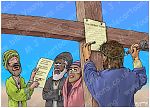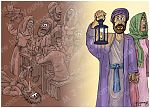Bible Cartoon: <-- Colossians : 1 Thessalonians -->
Click on Add to cart button below shopping cart.
Purchased Bible Cartoons do not have watermarks. Links to Cartoons provided on email once purchase is completed.1 Thessalonians
Book type: Letter (Epistle)
Author: Apostle Paul
No. of chapters: 5
Key character(s): God, Jesus, Paul, Timothy, Silas [1]
Brief description: 1 Thessalonians – Our destiny in a hostile world.
01) The church is founded on past faithfulness (1:1-10)
02) Opposition & persecution can not halt the gospel (2:1-20)
03) Concern for the church dominates the minister’s heart (3:1-4:12)
04) Problems related to the Lord’s return (4:13-5:11)
05) Concluding exhortations (5:12-28)
Paul’s first letter to the church in Thessalonica.
Thessalonica was the principal & capital city of the Roman province of Macedonia. The city was located on the Thermaic Gulf; possessed an excellent harbour, & had the added bonus of being on the Egnatian Way, an international highway connecting Europe & Asia.
The apostle Paul’s letter to the Thessalonian church gives us a great insight into the life of the early Christian church. The church faced pressing questions:
01) When would Christ return? And had those believers who had died missed the blessings of his return?
02) What should they expect from a minister? And who could they trust as a true spiritual leader?
03) What is the place of daily work in the life of Christians waiting for the second coming of Christ?
Paul answered these concerns in love, in his letter.
Theological conclusions.
1 Thessalonians answers questions about the church & provides vital doctrinal teaching for today’s church:
01) The mission of the church.
02) The role of the minister.
03) The nature of the Christian life.
04) The Christian reaction to physical death.
05) The nature of the second coming of Christ.
[Source: NIV Disciple’s Study Bible]
Themes in 1 Thessalonians:
Standing Firm in the Faith – The new believers in Thessalonica faced heavy opposition from both Jews and Gentiles. As first century Christians, they were constantly under threat of stoning, beatings, torture and crucifixion. Following Jesus Christ took courageous, all-encompassing commitment. The believers in Thessalonica managed to stay true to the faith even without the presence of the apostles.
As believers today, filled with the Holy Spirit, we too can stand firm in our faith no matter how difficult the opposition or persecution becomes.
Hope of the Resurrection – Besides encouraging the church, Paul wrote this letter to correct some doctrinal errors regarding the resurrection. Because they lacked foundational teachings, the Thessalonian believers were confused about what would happen to those who died prior to the return of Christ. So, Paul assured them that everyone who believes in Jesus Christ will be united with him in death and live with him forever.
We can live confidently in the hope of resurrection life.
Daily Living – Paul also instructed the new Christians on practical ways to prepare for the Second Coming of Christ.
Our beliefs ought to translate into a changed way of life. By living holy lives in faithfulness to Christ and his Word, we remain ready for his return and will never be caught unprepared.
[Source:http://christianity.about.com/od/newtestamentbooks/a/1-Thessalonians.htm]
Key Verses:
1 Thessalonians 1:6-7 (NLT)
So you received the message with joy from the Holy Spirit in spite of the severe suffering it brought you. In this way, you imitated both us and the Lord. As a result, you have become an example to all the believers in Greece—throughout both Macedonia and Achaia.
1 Thessalonians 4:13-14 (NLT)
And now, dear brothers and sisters, we want you to know what will happen to the believers who have died so you will not grieve like people who have no hope. For since we believe that Jesus died and was raised to life again, we also believe that when Jesus returns, God will bring back with him the believers who have died.
1 Thessalonians 5:23 (NLT)
Now may the God of peace make you holy in every way, and may your whole spirit and soul and body be kept blameless until our Lord Jesus Christ comes again.
[1]
Fuller list of major characters in 1 Thessalonians:
| Name | Notes |
| Jesus | ”Saviour”. Christ means “the Anointed One”. (aka Jesus of Nazareth, The Christ, The Messiah, Son of man, Son of God). The central figure of the New Testament, whose life, death, and resurrection are chronicled in the 4 Gospel books. |
| Paul | (aka Saul, “Asked for” Hebrew.) Native of Tarsus, the capital of Cilicia, a Roman province in the south-east of Asia Minor. Jew with Roman citizenship; Pharisee; persecutor of the early Christian church. Converted from Judaism to Christianity after encounter with resurrected Jesus on the road to Damascus (Acts 9:1-30). Thereafter called an apostle (Ro 1:1, 1Co 1:1, 2Co 1:1, Gal 1:1, Eph 1:, Col 1:1, 1Ti 1:1, 2Ti 1:1, Tit 1:1). Author of at least 13 of the 27 books of the New Testament: Romans, Phillipians, 1 & 2 Timothy, 1 & 2 Corinthians, Colossians, Titus, 1 & 2 Thessalonians, Philemon, Galatians, Ephesians. |
| Timothy | Τιμόθεος, Timótheos. Mother was a Jewess convert to Christianity, his father was Greek (Acts 16:1). Resident, and probable native of Lystra a city of Lycaonia. Apostle Paul’s companion and fellow-laborer, one of Paul’s own converts (1 Corinthians 4:17). (Acts 17:14; Acts 18:5; Acts 19:22; Acts 20:4; Romans 16:21; 1 Cor. 4:17; 1 Cor. 16:10; 2 Cor. 1:1, 19; Phil. 1:1; Phil. 2:19; Col. 1:1; 1 Thes. 1:1; 1 Thes. 3:2, 6; 2 Thes. 1:1; 1 Tim. 1:2, 18; 1 Tim. 6:20; 2 Tim. 1:2; Philemon 1:1; Hebrews 13:23) |
| Silas | Σίλας, Sílas, probably contraction for Σιλουανός, Silouanós; the Hebrew equivalents suggested are שָׁלִישׁ, shālīsh, “Tertius,” or שֶׁלַח, shelaḥ (Genesis 10:24) or שָׁאוּל, shāʾūl = “asked”. Roman citizen (Acts 16:37) who accompanied the Apostle Paul on most of his 2nd missionary journey (Acts 15-18). Along with Judas (called Barsabbas), Silas was described as “men who were leaders among the brothers” (Acts 15:22). The Silas of Acts is generally identified with the Silvaus of the Epistles (2 Corinthians 1:19, 1 & 2 Thessalonians 1:1, Peter refers to him as “a faithful brother” in 1 Peter 5:12). |





